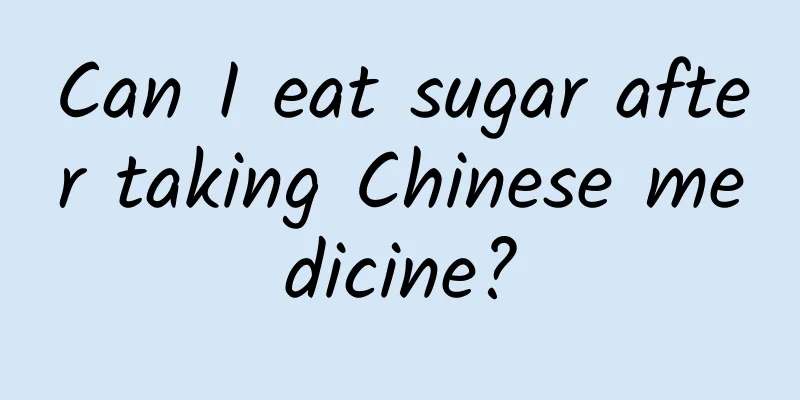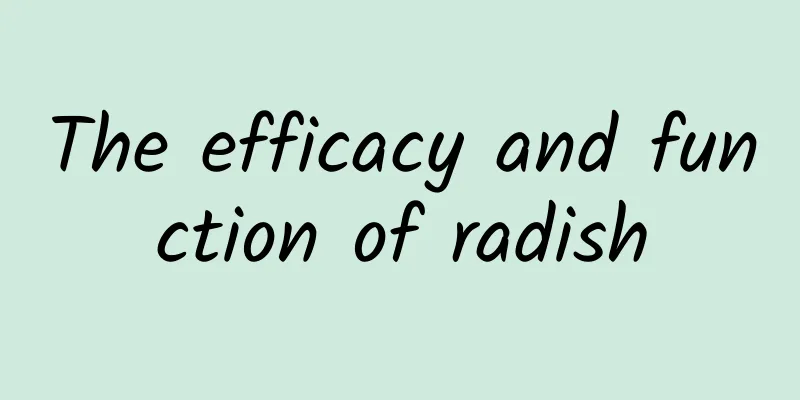Can I eat sugar after taking Chinese medicine?

|
Many people need to take Chinese medicine when they are sick, because Chinese medicine focuses more on conditioning and its efficacy is relatively strong. However, there are also many foods that cannot be eaten during the process of taking Chinese medicine, because some foods are easy to react with Chinese medicine. Sugar is a kind of food that we often come into contact with in our lives. It can decompose many components in our body. So can we eat sugar after taking Chinese medicine? Why it is not advisable to eat sugar after taking Chinese medicine In each prescription, the medicinal flavors of the ingredients are different, including "sour, bitter, sweet, pungent, and salty", and the medicinal properties are also different, including "cold, hot, warm, and cool". Sugar also has certain medicinal properties and therapeutic effects. Sugar can moisten the lungs and the middle, nourish the spleen and soothe the liver. It can be used to treat dry cough, dry mouth and tongue, middle-jiao deficiency, stomach pain and other symptoms. Therefore, Chinese medicine also regards sugar as a Chinese medicine and it should not be used casually. In addition, it is also contraindicated in clinical use. First of all, eating too much sugar will increase heat. If the patient has symptoms of damp-heat retention such as abdominal distension, fullness, thick and greasy tongue coating, it is generally forbidden to add sugar to avoid adverse reactions. People with phlegm should not take it. Secondly, white sugar is cool in nature and brown sugar is warm in nature. If white sugar is added to warm medicines, or brown sugar is added to cold medicines, the medicinal properties will be weakened, hindering the full absorption of the medicinal effects and affecting the efficacy. Thirdly, the chemical composition of traditional Chinese medicine is relatively complex. Sugars, especially brown sugar, contain more iron, calcium and other elements. Proteins, tannins and other components in traditional Chinese medicine can combine with them to produce chemical reactions, causing some effective ingredients in the medicine solution to coagulate and denature, and then produce turbidity and precipitation, which not only affects the efficacy of the medicine but also endangers health. Many people feel that traditional Chinese medicine is too bitter, so they add appropriate amount of sugar to the medicine. However, you may not know that if sugar is added to the medicine, it will lose its medicinal properties, which means it will have no effect when taken. Therefore, you must be careful not to add sugar to traditional Chinese medicine, as it will not be good for your body. Drinking Chinese medicine like this can relieve the bitterness Using a straw to suck Chinese medicine Because the bitter taste receptors on the human tongue are mainly concentrated in the front half of the tongue, with the tip of the tongue being the most prominent. Therefore, using a straw to suck Chinese medicine can reduce the bitter taste of the medicine. When inhaling Chinese medicine, place the straw at the root of the tongue to allow the liquid medicine to enter the throat directly, avoiding the liquid medicine from contacting the taste buds at the tip or middle of the tongue. This will naturally reduce the bitterness to a great extent. When choosing a straw, it is best to use a yogurt straw with a large diameter to facilitate the delivery of the medicine solution. Of course, this method is not suitable for children who are too young to avoid choking when drinking. Master your location The taste buds on the tongue that sense bitterness are concentrated at the root of the tongue, so when taking medicine, you should try to avoid too much contact between the root of the tongue and the medicine solution; when taking bitter pills, you should also place the medicine on the tip of the tongue and then take it quickly with warm water. Let it cool before drinking The way to reduce the bitterness is not to drink Chinese medicine while it is hot (except for antipyretic and diaphoretic drugs). This is because the tongue's taste sensation is related to temperature. The liquid medicine is cooled to between 20 and 36 degrees Celsius, making it easy to swallow quickly and not too bitter. Because the temperature inside a normal person's mouth is 36.2-37.2 degrees Celsius, when the temperature of the medicine is close to the temperature of the tongue, the taste nerves are most sensitive, and the medicine tastes the bitterest at this time. When the temperature of the decoction is higher than 38 degrees Celsius or lower than 36 degrees Celsius, the taste nerves are less sensitive and the bitterness will be weakened. However, decoctions above 38 degrees Celsius may burn the oral mucosa, so 20-36 degrees Celsius is the best choice. |
<<: How big is the belly at 28 weeks of pregnancy
>>: Classic prescription for nourishing spleen and kidney
Recommend
What are the effects and functions of Cynomorium songaricum
In our lives, many people pay great attention to ...
The efficacy, function and edible method of ground grass
Corydalis, also known as Corydalis, is a plant of...
Do you still remember these moments in 2021?
Looking back at 2021 We have been touched and pro...
The efficacy and function of Kuding
Kuding is a very common Chinese medicine. Althoug...
What are the effects and functions of whole insects?
Quanchong is a relatively common Chinese medicine...
Wang Qinnan: The sweet promise of the "watchman" of the sugarcane field when the sugarcane flowers bloom
In the vast fields of Guilin, Guangxi, the sugarc...
Bounce off the leech that jumped onto your leg. Picking mushrooms turns out to be more stressful than "drawing blind boxes"...
If the little girl picking mushrooms walks barefo...
The efficacy and function of Sichuan lotus
Previously, we introduced to you the value and fu...
The efficacy and function of red peony root
Do you know what red peony root is? If you know, ...
Drinking a bottle of Huoxiang Zhengqi water when you have a heat stroke? Nonsense, this is a suicidal act!
We all know how hot the weather has been recently...
Scientists have discovered that there may be a reason why "one pregnancy makes a woman stupid for three years"
I believe everyone has heard the saying "pre...
How to handle fresh Cynomorium songaricum
How should fresh Cynomorium be processed? There a...
Wearing pajamas VS sleeping naked, which is healthier? The truth is surprising
What is the happiest thing in a day? Of course it...
How to keep her energy job? She looks for oil in shale cracks
Your browser does not support the video tag Oil i...









